Projects and Flagship Initiatives in Malawi

Our nature of work has evolved in Malawi. Under the Pan African Bean Research Alliance (PABRA), our scope was expanded beyond bean breeding to include the development of multi-stakeholder platforms and bean processing or value addition. These workflows are aimed at engendering private sector development and long-term sustainability of interventions throughout the bean value chain.
Reflecting the continued evolution of the Alliance's mission, Malawi hosts the Business Acceleration for Youth Activity (formerly known as YBAIF), Developing Climate Smart Innovations through Research in Agriculture (DESIRA) and Harvest Plus projects among many other projects. Explore some of these projects below.
Southern Africa Bean Research Network (SABRN)
Our Malawi office is coordinating office of the Southern Africa Bean Research Network (SABRN). SABRN is a twelve-member state network of Angola, Botswana, Southern Democratic Republic of Congo (DRC), Eswatini, Mauritius, Malawi, Mozambique, Lesotho, south Africa, southern Tanzania, Zambia and Zimbabwe.
The primary objective of the network is to promote the wider availability and increased utilization of demand-driven bean-based technologies. These technologies aim to enhance agricultural sustainability, productivity, and value addition to the bean commodity, while also improving nutrition, food security, and incomes of both rural and urban populations in southern Africa.
SABRN focuses on several core activities, including breeding, seed systems, integrated crop management, nutrition, and market facilitation. The financing of network activities is provided through bilateral agreements and various initiatives.
Business Acceleration for Youth project-2021-2026
Business Acceleration for Youth is a five-year, innovative project funded by USAID Malawi and led by the Alliance of Bioversity International and International Center for Tropical Agriculture (CIAT). Framed around a resilience-led sustainability strategy, the project aims to strengthen the resilience of youth and women-led enterprises in Mangochi, Balaka, Machinga, Zomba, Chiradzulu, Chikwawa, Nsanje, Mulanje and Thyolo through the delivery of business development services creating growth-orientated, sustainable firms able to secure and effectively utilize investment.
The purpose of this project is to accelerate and invest in youth-led enterprises that result in job creation, greater access to financing, diversified incomes, a more inclusive private sector and improved household resilience in targeted vulnerable districts.
The project has three components;
- Incubation program: This Component focuses on supporting 450 early-stage businesses to develop their basic business model, test their proof of concept and establish the business’ internal structure that can help the businesses to grow. The goal is to provide a supportive environment for early-stage businesses, help turn their ideas into viable businesses and help them navigate the challenges of starting a business and increase their chances of success.
- Acceleration program: This component is targeting 60 Small and Medium Enterprises (SMEs) which have moved beyond the early phase and can no longer grow solely based on the reinvestment of internal revenues. To maximize their growth phase, they need external investment. The goal is to support SMEs secure financing to accelerate their growth and reach their full potential through provision of bespoke technical assistance and mentorship.
- Access to finance and investment: The project has a financing component that will support 200 early-stage businesses under the incubation program secure financing amounting to $2500. 30 SMEs will also be supported with matching grants of up to $75,000 under the Acceleration program.
The Accelerated Innovation Delivery-Initiative (AID-I) project
The Accelerated Innovation Delivery-Initiative (AID-I) is a two-year-initiative funded by the United States Agency for International Development (USAID) through the International Maize and Wheat Improvement Centre (CIMMYT). The objective is to accelerate last-mile delivery of agricultural tools, technologies and production methods that will help smallholder farmers in sub-Saharan Africa to boost their productivity, efficiency and incomes. By addressing systemic constraints in both maize and legume seed systems value chains the initiative will support smallholder producers, small and medium agricultural enterprises, and national partners to maintain and strengthen food production.
The AID-I project is coordinated by the Malawi office and implemented in Tanzania, Zambia, and Malawi. In these countries, the project builds upon existing investments, including the USAID-funded Future Innovation Lab for Legume Systems Research through Transforming Seed Systems to Respond to Bean Variety Demand through Multi-Stakeholder Platforms in Malawi (MSP) project, as well as the Improving Bean Productivity and Marketing in Africa (IBPMA) initiative supported by Global Affairs Canada (GAC). These collaborations leverage private sector investments to accelerate the delivery of innovative solutions.
Partnerships with prominent grain off-takers such as Paramount Holdings, Milele Agroprocessing, and Food Agribusiness and Development Company have been established. These grain offtakers have committed to procuring over 5,000 metric tons of beans in 2025, amounting to a value of 5 million USD. Working in tandem with scaling non-governmental organizations and farmer organizations like the National Smallholder Farmers Association, Catholic Development Commission, and Evangelical Association of Malawi, these grain offtakers promote the adoption of improved bean varieties and complementary production technologies through an inclusive approach.
To ensure that certified seed reaches farmers in all bean production hubs linked to the off-takers, a demand-led seed system has been adopted. The project has partnered with DWK Macpherson, EASI seeds, Nema seed, Mgomera seeds, and Seed Co to support seed production.
Developing Climate Smart Innovations through Research in Agriculture (DESIRA)
DESIRA is a five-year EU-funded research project aimed at addressing challenges in the smallholder agri-food system in Malawi. Its primary objective is to develop climate-smart, integrated technological options that are adapted to local conditions and the realities faced by farmers. To achieve this, the program involves a comprehensive understanding of the socio-economic conditions that either promote or hinder technology adoption through a multi-institutional and multidisciplinary research effort.
The overarching goal of the project is to enhance the productivity, profitability, and sustainability of agriculture and food systems in Malawi. The project is being implemented by seven CGIAR centers in Malawi, in collaboration with the Ministry of Agriculture and academic institutions. Under the project, we are conducting three research studies;
- Evaluation of common bean (Phaseolus vulgaris L) genotypes under sole cropping and intercropping with maize (Zea mays L) in Malawi.
- Evaluation of efficient, low soil fertility-tolerant common bean (Phaseolus vulgaris L) varieties for drought stress adaptation in Malawi.
- Assessing genotypic resistance and the efficacy of seed treatments against bean stem maggots in common bean (Phaseolus vulgaris L), as well as evaluating the effectiveness of bio-pesticides in protecting stored beans against bruchids.
Sustainable Intensification of Mixed Farming Systems
This is a research initiative led by CGIAR with the goal to provide equitable, transformative pathways for improved livelihoods of actors in mixed farming systems through sustainable intensification within target agroecologies and socioeconomic settings. In Malawi, the initiative is focussing on agronomic biofortification of maize, common bean and soybean under strip cropping systems. To assess crop uptake response to increased zinc application (30 kg Zn ha-1), farmer-managed participatory action trials have been initiated in Mzimba and Kasungu districts. The trials include the following crops: Maize, Pigeon pea, Soybean, and two varieties of Common bean – NUA 45 (a biofortified bean variety) and Kholophethe (a non-biofortified variety).
For the 2022/2023 season, the initiative aims to involve 10 trial host farmers, with 6( 4 involve maize, common bean and pigeon pea strip cropping while 2 involve maize, soybean and pigeon pea strip cropping) located in Kasungu and 4 (all of which involve strip cropping of maize, common bean, and pigeon pea) in Mzimba. In the subsequent 2023/2024 season, the targets are to engage 10 mother trial host farmers (6 in Kasungu and 4 in Mzimba) and 300 baby trial host farmers (180 in Kasungu and 120 in Mzimba).
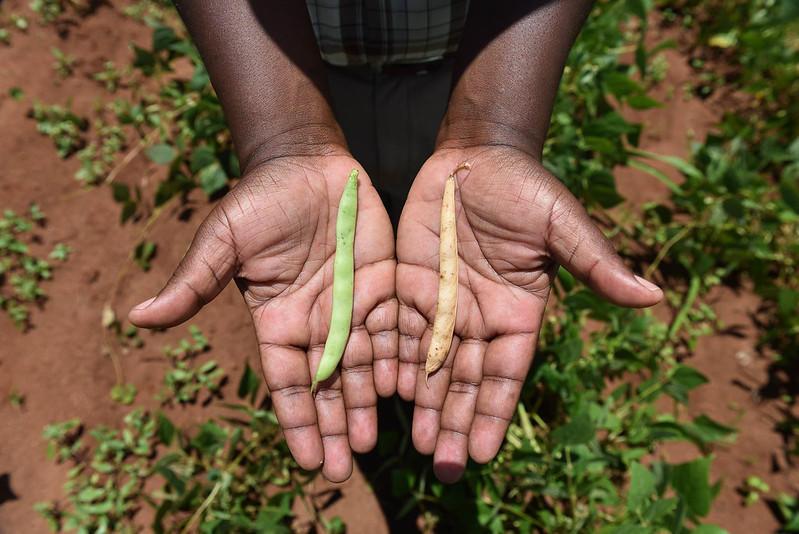
Trials of drought tolerant beans in Malawi, which is suffering from its worst drought in three decades. The pod from the drought tolerant variety is yellow, indicating early maturity, enabling the plant to escape the severity of the drought.
©Alliance/NeilPalmer
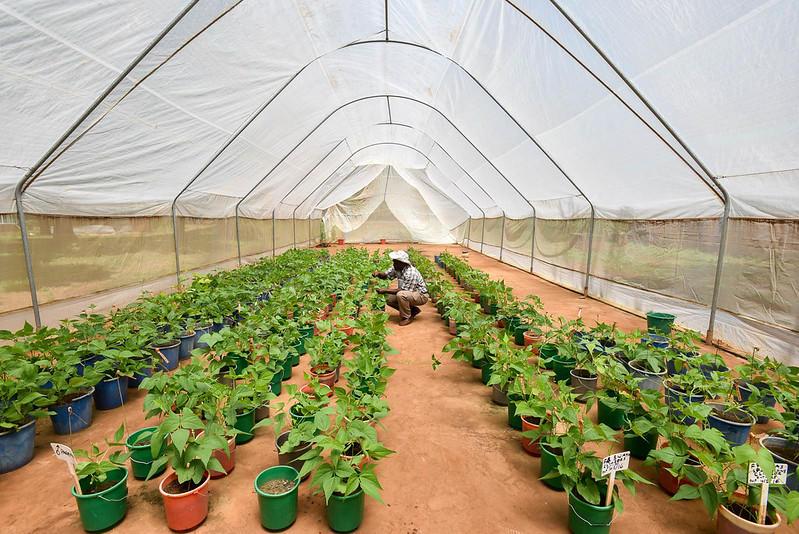
Trials of drought tolerant beans in Malawi, which was suffering from its worst drought in three decades at the time of the Alliance trial seven years ago.
©Alliance/NeilPalmer
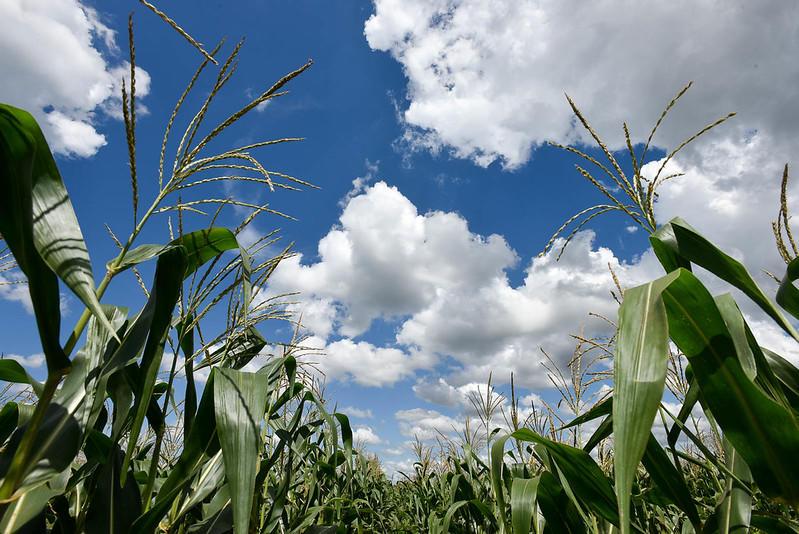
Maize crops in Malawi, which was suffering from the worst drought in three decades at the time seven years ago.
©Alliance/NeilPalmer
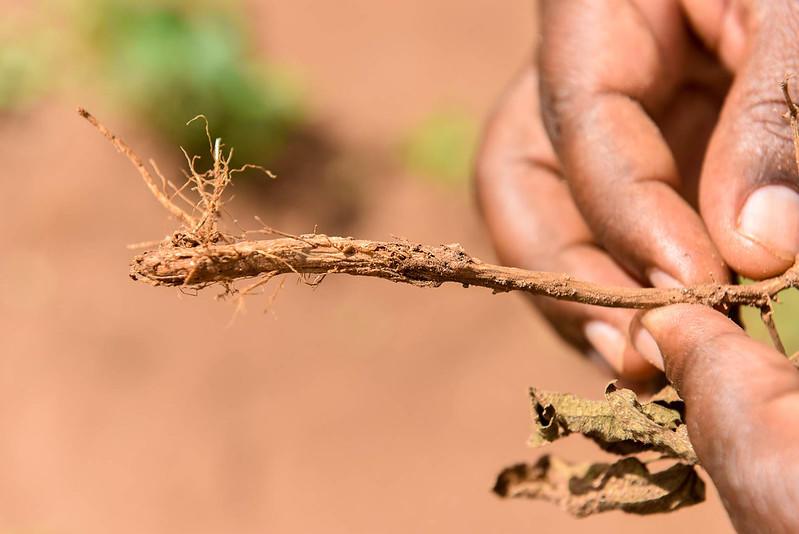
Effects of the bean stem maggot on crops in Malawi. ©Alliance/NeilPalmer
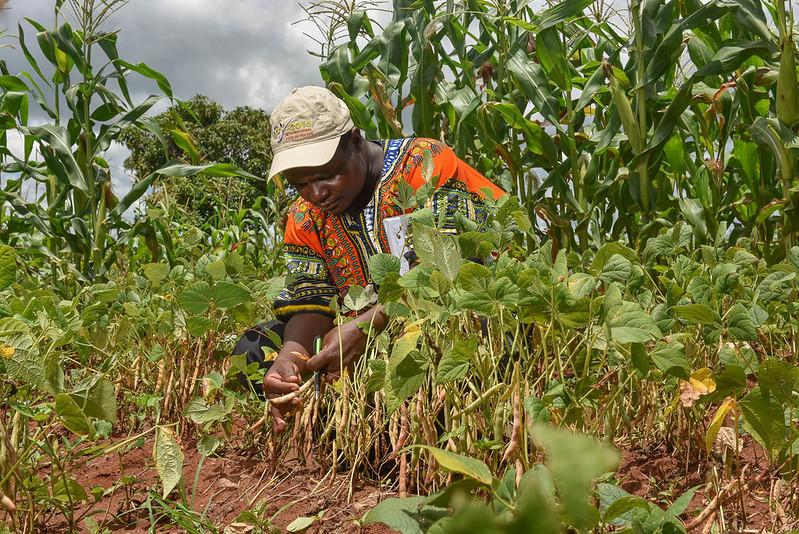
Trials of drought tolerant beans in Malawi, which was suffering from its worst drought in three decades at the time of the Alliance trial seven years ago.
©Alliance/NeilPalmer
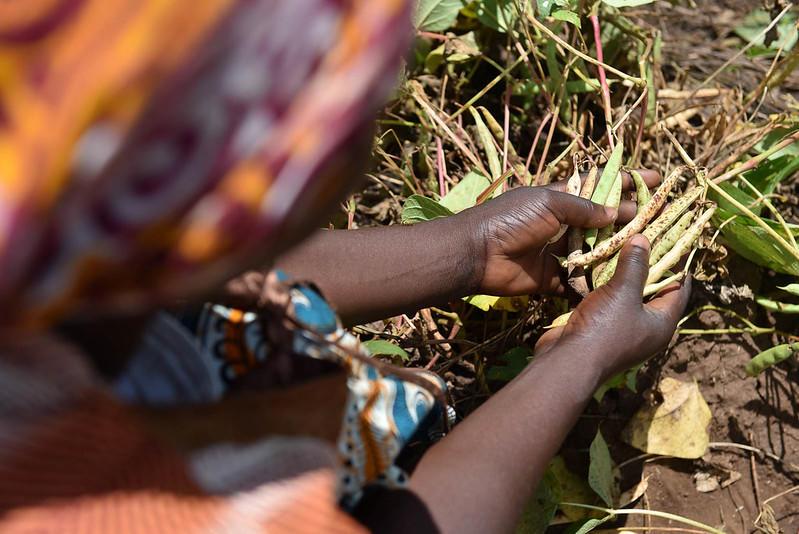
Malawi Biofortified Basket School Feeding Program
The Malawi Biofortified Basket School Feeding program is funded by The Trustees of Waterloo Foundation and implemented by Harvest Plus. The objective of this project is to increase consumption of micronutrient rich foods for 6,000 school children of Standards 1-8 from 20 primary schools in Lilongwe and Kasungu. HarvestPlus is working with partners already engaged in school feeding programs in 20 primary schools in two districts: Lilongwe and Kasungu. Through these partners, HarvestPlus is initiating home grown school feeding, by facilitating the production of biofortified crops (vitamin A maize and iron beans) in those schools, or by school committee members. 6000 learners have been targeted with 300 farm clubs involved and 9000 families reached under the project.
Advancing Availability of Biofortified Foods in Institutional Markets
With support from the Rockefeller Foundation through AGRA, Harvest Plus is implementing the Advancing Availability of Biofortified Foods for Institutional Markets to increase access to nutritious food at school. While the activities led by AGRA focus on catalyzing increased biofortified seed and grain production, HarvestPlus-led activities simultaneously and specifically increase demand and availability of biofortified crops in 150 schools in 4 districts of Rumphi, Mzimba, Lilongwe and Machinga. 180,00 people and 120,000 learners have reached with Biofortified foods in 3 years.
Strengthening Production and Consumption of Biofortified Crops
This project is funded by EU and FAO implemented by Harvest Plus to improve access of biofortified crops to 30,000 people in 11 districts.
Under this project, 30,000 beneficiaries have been reached with biofortified crops, 60 metrics of biofortified maize seed and 60,000 bundles of sweet potato vines have been procured and distributed to beneficiaries.
Scaling Iron Beans in Malawi
It is funded by JBG Foundation and implemented by Harvest Plus to increase bean yields to over 800kg per hectare among 42,000 farmers in 3 years in Malawi.
